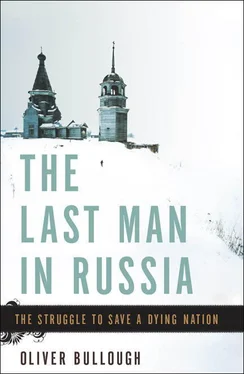Even a book as plodding as Dr Zhivago proved electrifyingly controversial for the Soviet state. Its author, Boris Pasternak, was hounded to an early grave in 1960 for not conforming to the standards expected of a Soviet novelist, and for daring to have it published abroad. Despite the treatment of Pasternak, however, a small group of writers insisted on writing their own way. Smuggling their manuscripts abroad was their protest against the state’s insistence on obedience in all things. At that time, creative endeavours needed state approval, which meant these upstarts had to be crushed. In a defining moment, in February 1966, Andrei Sinyavsky and Yuli Daniel, two writers who had published books in the West, were put on trial to show their peers that such independence could not be allowed.
They were not pro-Western as such, but they hated being stultified by what was going on around them, and their trial is symbolic of what a whole generation was going through. ‘The cost of obedience was a tension, an anxiety that only increased as the years went by. He was a born writer, not a soldier,’ one friend wrote of Sinyavsky. Soldiers obey, but writers question, and the system would not tolerate questions.
The body of self-printed and distributed literature – samizdat – produced by these men and those that followed is a crucial source for what was going on beneath the veneer of success that the Soviet Union presented to the world. It was here, for the lack of anything else, that I began to look for the reasons why Russians began to drink in such quantities.
My research got me nowhere, however. The dissidents’ concerns were lofty and admirable – freedom of speech, freedom to emigrate, the right to a fair trial – but did not seem the kind of thing to drive a mass epidemic of alcoholism. Then I found a book by Ludmilla Alexeyeva, a veteran of the human rights struggle who was forced into exile in 1978. Perhaps because she was living in the United States, she took a broad view of the country, and looked outside the capital.
She wrote how Russians everywhere had become depressed by the hypocrisy of corrupt officials who promised a bright future for others while enjoying the fruits of the present themselves. The Russian state was killing hope, and humans cannot survive without it. In the vacuum, people reached out for anything available, including God.
The hunger for religion… was not a result of the efforts of the church, but rather of the decay and corruption of official ideology. It spread over the entire country and affected all social groups. Enormous numbers of people tried to fill the resulting spiritual and intellectual vacuum with alcohol, others tried to fill it with the most diverse kind of activities, from gardening to philosophy.
The Russian Orthodox Church, like the official hierarchies of the Muslim, Jewish and Buddhist congregations in the Soviet Union, had been infiltrated by and subordinated to the state. Although communists had begun by assaulting religion and imprisoning priests, Stalin realized during World War Two that the patriotic appeal of defending the faith was a useful mobilizer of men.
The Orthodox Church was not a monolith, however. Among its priests were some who did not support the government slavishly in all things, as their bishops did. And among those priests was a man called Dmitry Dudko – Father Dmitry, to his friends. Alexeyeva described him in her book, so I read his work. He, I realized quickly, was an exceptional man.
While the state was engaged in producing reports on how well it was doing, and the dissidents were engaged in proving it wrong, Father Dmitry was quietly comforting the miserable and the downtrodden. And he was not just a compulsive comforter; he was a compulsive writer. He left notebooks and articles and sermons: hundreds of thousands of words. These ranged from accounts of parishioners’ confessions to autobiographical sketches, to poems, to sermons. They are a priceless source for anyone seeking to understand how communism, a movement intended to perfect humanity, turned into a system of oppression and misery.
The communism he describes is not one that aims for a radiant future, despite its claims. The Soviet state was, in fact, almost perfectly designed to make people unhappy. It denied its citizens not just hope, but also trust. Every activity had to be sanctioned by the state. Any person could be an informant. No action could be guaranteed to be without consequence. Father Dmitry preached friendship and warmth and belief to his parishioners, and inspired a generation to live as humans and not as parts of a machine.
And Father Dmitry, I realized, as I read his books and delved into his world, was more than a witness and an agitator. His life story – from his birth in a Russian village after the revolution, to his death in Moscow in 2004 – is also the history of his nation. He lived through collectivization, the crushing of the 80 per cent of Russians that were peasants. He served as a soldier in World War Two, when millions of peasants died defending the government that had crushed them. He spent eight years in the gulag, the network of labour camps created to break the spirit of anyone who still resisted. He rose again to speak out for his parishioners in the 1960s and 1970s, striving to help young Russians create a freer and fairer society.
Those decades are little written about today, but they are central to Russia’s population crisis, so those are the decades this book focuses on. It is not a biography of Father Dmitry, nor is it a history of the Russians’ twentieth century. Instead, it is something in between. Father Dmitry’s life, for me, is the life of his nation in microcosm. In tracing the life and death of Father Dmitry, I am tracing the life and death of his nation.
How did Russia become a country where my friend Misha considers it acceptable to drink a litre of brandy before embarking on a day’s work? And how did it become a country where no one finds that strange – a country where brandy is on sale beside fried eggs, sausage and bread at breakfast time? One man’s alcoholism is his own tragedy. A whole nation’s alcoholism is a tragedy too, but also a symptom of something far larger, of a collective breakdown.
Public life in Russia is stubbornly dishonest. Transparency International’s yearly survey ranks countries on a 10-point scale, where 10 is very clean and 0 is highly corrupt (New Zealand came top in 2011 with 9.5, Somalia and North Korea came last with 1). Russia has, since the survey began in the 1990s, consistently scored between 2.1 and 2.8, putting it in the company of Nigeria and Belarus, and below the likes of Syria, Pakistan and Eritrea. Russians consider themselves civilized Europeans, but have to endure the humiliation of daily encounters with officials that belong in a squalid dictatorship.
I once asked Kolya, a friend of mine, what he would do first if he became president. Kolya is jovial and loud, so I expected he would announce something funny. Perhaps he would legalize polygamy for people whose names begin with a K. He sat and thought for more than a minute. He stared at his glass of beer and toyed with a cigarette.
‘I would kill myself,’ he said at last, without a trace of a smile.
It is hardly surprising that Russians have long been unenthusiastic about politics. In one yearly survey from the Levada Centre, a polling organization, the options to choose from are ‘life isn’t so bad, you can survive’, ‘life is bad, but you can endure’ and ‘enduring our calamitous situation is impossible’. There has been a slow move from the third category to the second since the late 1990s, but the fact that those are the only categories does not suggest that this is a country happy about the future.
In this book, I ask how this came about. It is not only a journey into the past, however, because the Russian population crisis could have enormous consequences for the future. In the Chinese province of Heilongjiang there are more than 38 million people. In Russia’s Maritime, Amur and Birobidzhan regions, which border it to the north and are collectively not too much larger, there are around 3 million people. If that number keeps falling, then it is easy to wonder if the Chinese might think the Russians do not want that land and decide to take it from them. The modern world has never had to confront a situation where a country does not have enough people to support itself any more.
Читать дальше












